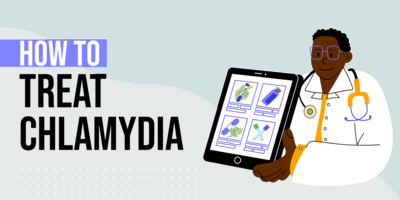
How to Treat Chlamydia
Chlamydia is a bacterial infection that is spread by sexual contact, according to the CDC. It is one of the most...
Read moreHelp patients book appointments with you on Solv. It's free!
9 instant-book locations

Help patients book appointments with you on Solv. It's free!
The Centers for Disease Control and Prevention (CDC) recommends that sexually active women under the age of 25, as well as older women with risk factors such as new or multiple sex partners, or a sex partner who has a sexually transmitted infection, should get tested for chlamydia annually. Men who have sex with men should also get tested at least once a year. If you live in Oxford, MS, and fall into any of these categories, it is advisable to get tested.
Getting tested for chlamydia is crucial as it is often asymptomatic, meaning it can go unnoticed and untreated. If left untreated, chlamydia can lead to serious health problems such as pelvic inflammatory disease in women, which can cause permanent damage to the reproductive system and lead to long-term pelvic pain, infertility, and ectopic pregnancy. In men, chlamydia can cause a condition called epididymitis, which can lead to infertility if not treated. Furthermore, chlamydia can increase the risk of getting or giving HIV, the virus that causes AIDS. Therefore, getting tested is essential for maintaining good sexual health and preventing the spread of the infection.
There are several urgent care and walk-in clinics in and around Oxford where you can get tested for chlamydia. For instance, Oxford Urgent Care, located at 1929 University Ave, Oxford, MS 38655, offers STD testing. Urgent Team in Batesville, MS, another highly-rated clinic, also provides STD testing services.
Your primary care provider can also test for chlamydia. If you don't have a primary care provider, you can find one through Solv's website and mobile app, which allows you to book same-day and next-day appointments with trusted healthcare providers in your area.
Community health centers often offer free or low-cost STD testing. It's worth checking with local centers in Oxford and nearby cities like University, Taylor, and Abbeville to see what services they offer.
At-home testing kits for chlamydia are also available. These kits can be ordered online, used at home, and then sent to a lab for testing. Results are usually available within a few days.
While specific data on the prevalence of chlamydia in Oxford, MS, is not readily available, according to the CDC, Mississippi has one of the highest rates of chlamydia in the country. This suggests that chlamydia could be a significant health issue in Oxford and surrounding areas like Lafayette County and nearby counties such as Webster County and Fayette County.
Risk factors for chlamydia in Oxford are likely similar to those in other parts of the country. These include being sexually active and under 25, having new or multiple sex partners, and having a sex partner who has a sexually transmitted infection. Other factors, such as lack of condom use and previous history of STIs, can also increase the risk.
In addition to chlamydia, other STDs such as gonorrhea, HIV, syphilis, and hepatitis are also of concern in Oxford and surrounding areas. Like chlamydia, these STDs can have serious health consequences if left untreated, further emphasizing the importance of regular testing. Again, you can find and book appointments for STD testing in Oxford through Solv's website and mobile app.
Solv has strict sourcing guidelines and relies on peer-reviewed studies, academic research institutions, and medical associations. We avoid using tertiary references.
A chlamydia test is an STD test that can tell you if you have chlamydia or not. According to A chlamydia test is used to determine the presence of chlamydia bacteria in the body, according to the National Institutes of Health. It can be used to confirm whether you have chlamydia even if you don't have any symptoms. According to the National Institutes of Health, chlamydia symptoms include pain when peeing and frequent urination. It can cause abnormal vaginal bleeding in women, and it can cause discharge from the penis in men. the NIH, it can be done as a urine test or a swab test, albeit the swab test is normally only done on women. Many healthcare practitioners that provide lab test services can deliver a chlamydia test.
A chlamydia test is used to identify whether chlamydia bacteria is present in the body, according to the National Institutes of Health. It can be used to determine whether you have chlamydia even if you don't have any symptoms. According to the National Institutes of Health, chlamydia symptoms include pain when peeing and frequent urination. It can cause abnormal vaginal bleeding in women, and it can cause penile discharge in men.
A chlamydia test can reveal whether or not you have the STD and help you avoid infecting others. For sexually active women under the age of 25, males who have intercourse with men, HIV patients, and pregnant women under the age of 25, the National Institutes of Health recommends yearly chlamydia tests. This STD test is particularly recommended for women over the age of 25 who have had multiple sexual partners and whose partners have used condoms incorrectly or inconsistently.
According to the National Institutes of Health, the chlamydia test provider will ask you to urinate into a sterile collecting cup during the urine test. Lab technicians examine your urine sample for the presence of chlamydia bugs. According to the National Institutes of Health, a healthcare provider will use a swab or brush to collect a sample of cells during a pelvic exam. After that, the sample is transported to a laboratory for analysis.
According to the National Institutes of Health, lab test providers may advise women getting a chlamydia test to avoid using vaginal douches or lotions for at least 24 hours prior to the test. It's also possible that men and women will be asked to stop taking antibiotics for at least 24 hours before the STD test.
Symptoms of chlamydia usually show one to three weeks after infection, according to the University of Wisconsin. However, 75 percent of women and 50 percent of men with chlamydia exhibit no symptoms, according to the institution. The only way to find out whether you have chlamydia is to go to an STD testing center and take a chlamydia test. Symptoms of chlamydia usually show one to three weeks after infection, according to the University of Wisconsin. However, 75 percent of women and 50 percent of men with chlamydia exhibit no symptoms, according to the institution. The only way to find out whether you have chlamydia is to go to an STD testing center and take a chlamydia test.
You shouldn't test positive for chlamydia after you've done therapy. According to the University of Rochester Medical Center, chlamydia can be successfully treated with azithromycin or doxycycline. According to the University of Rochester Medical Center, people with lymphogranuloma venereum, a kind of chlamydia, may need 21 days of treatment. Furthermore, the institution recommends that you refrain from all sexual activity for at least seven days or until your chlamydia treatment is finished.
A chlamydia test is available at many healthcare facilities that perform lab tests and STD testing services, such as hospitals, urgent care centers, and walk-in clinics. Solv is one of the simplest and most convenient ways to locate chlamydia test providers in your area. Type "chlamydia test" or "STD testing" into the search field on Solv's website, then enter your location to find top-rated providers and arrange an appointment online.
Annual Wellness Exam in Oxford
Chickenpox Vaccine in Oxford
DOT Exam in Oxford
Ear Wax Removal in Oxford
Eye Exam in Oxford
Flu Shot in Oxford
Hepatitis Vaccine in Oxford
Measles Vaccine (MMR) in Oxford
Pap Smear in Oxford
Physical Exam in Oxford
Shingles Vaccine in Oxford
Sinus Infection Treatment in Oxford
Sports Physicals in Oxford
Tetanus Shot in Oxford
Typhoid Vaccine in Oxford
Well-Woman Exam in Oxford
Yellow Fever Vaccine in Oxford
A1C Test in Oxford
CMP Test in Oxford
Chlamydia Test in Oxford
Diabetes Test in Oxford
Gonorrhea test in Oxford
H Pylori Test in Oxford
HIV Test in Oxford
Hepatitis test in Oxford
Herpes Test in Oxford
Mono Test in Oxford
Pregnancy Test in Oxford
STD Testing in Oxford
Strep Test in Oxford
Syphilis test in Oxford
TB Test in Oxford
Thyroid Test in Oxford
Trichomonas Test in Oxford
Vitamin D Test in Oxford
Tips, advice, news—your resource to stay healthy and safe while improving your experience with healthcare providers when you need them.